- Español
- English
Universal Civil Identity Project of the Americas (PUICA)
- Guatemala:
Between 2011 and 2013, PUICA supported the installation of 18 hospital registry offices in Guatemala. As a result of this project, in 2013, 73 percent of births in national hospitals were registered through the hospital registration system. The project promoted the institutional strengthening of the National Registry of People (RENAP by its Spanish acronym), as well as its commitment to the eradication of under-registration. Since the completion of this OAS project, RENAP has installed 27 additional offices, including offices in hospitals that are part of the social security network. Currently, the birth registration service is available in 45 hospitals in the country, in which 114,640 births were registered in 2015.
- El Salvador:
PUICA supported the installation of 13 auxiliary offices of the National Registry of Natural Persons (RNPN) in national hospitals between 2008 and 2014. In the specific case of El Salvador, the installation of hospital auxiliary offices requires the signature of an agreement between municipalities and the National Registry of Natural People (RNPN by its Spanish acronym). Currently of the 262 municipalities of El Salvador 150 have signed agreements to facilitate the hospital registration of births. The current coverage of the hospital system is 56% of births in national hospitals.
- Honduras:
PUICA supported the installation of registry offices in seven hospitals in Tegucigalpa, San Pedro Sula, Santa Barbara and El Progreso. The project helped the National Registry of Persons (RNP) to comply with the Maternity and Responsible Parenting Act, approved by the National Congress. This Act facilitates the implementation of the hospital registration offices and promotes the immediate registration of the child with the creation of mobile registries, coordinated by the RNP.
- Paraguay:
The installation of hospital registries in Paraguay is provided for in the Program for the Right to an Identity of the National Government, which is sponsored by the Vice Presidency of Paraguay. Registration offices were installed in four hospitals: Hospital San Pablo in Asunci´┐Żn, the Regional Hospital of Concepci´┐Żn, the Hospital of Caazap´┐Ż and the Hospital San Pedro in Santa Rosa de Aguaray. In Paraguay, it is possible to enter registration data directly from the hospital office through a VPN network.
-
Panama:
PUICA provided financial assistance to develop and install a biometric verification system in the Santo Tomas Hospital in Panama City, in which 23 % of all births take place nationwide. This verification system immediately links the identity of the mother to the child, which contributes both to impede the trafficking of minors and to improve information on newborns.
2. Mobile Registration Campaigns:
- Support to the Office of National Identification of Haiti in the
provision of identification cards to Haitian migrants in the Dominican
Republic
Migration flows between the Dominican Republic and Haiti are extremely dynamic and present numerous challenges. According to United Nations Population Fund estimates, over half a million foreigners lived in an irregular migratory situation in the Dominican Republic in 2012, 458,233 of which came from Haiti. The lack of official identity documents constitutes a longstanding problem for Haitians, which affects both Haitians who reside in Haiti and those who live abroad.
PUICA initiated a project aimed at helping Haitian migrants who reside in the Dominican Republic access identification documents. In Haiti, the Project will contribute to the institutional strengthening of the National Identification Office (ONI) and the National Archives (ANH), as well as to the development and implementation of coordination mechanisms between institutions responsible for providing identification services to Haitians living abroad. In the Dominican Republic, technical assistance as well as material and human resources will be provided to facilitate the delivery of identification documents to Haitian migrants, particularly those who are registered in the National Plan for the Regularization of Foreigners (PNRE by its Spanish acronym) and do not possess national identity documents.
- Central American Northern Triangle. Guatemala - Honduras - El Salvador
The border area between El Salvador, Honduras and Guatemala has a length of approximately 7,500 square kilometers. The region, known as the Central America’s Northern Triangle, has a strategic importance since 75% of Central America’s road network is concentrated within a radius of 250 kilometers of the tri-border area. As there is no defined boundary line and movement of people between the three countries is fluid, timely birth registration is affected. Economic factors also affect timely registration and contribute to under-registration rates in the region. For example, the border areas are partly populated by temporary workers or migrants who use these areas as corridors to travel to North America.
The OAS Central American Northern Triangle project, now in its second phase, seeks to increase the registration and identification rates in the border municipalities of Guatemala, Honduras and El Salvador, as well as to improve the efficiency in the exchange of information between the national civil registries. The first phase culminated in June 2016 and included two main components: 1) Installation of five civil registration offices at border-crossing points in Guatemala and Honduras; 2) Training workshops for municipal registrars in the three countries as well as awareness-raising campaigns aimed at community leaders in border municipalities.
In addition, a registration campaign was implemented in El Salvador, in the municipality of San Fernando, Chalatenango. The campaign had 181 beneficiaries and facilitated the correction of registry errors, late registration of births and naturalization procedures for Honduran citizens who acquired Salvadoran citizenship.
3. Reconstruction of Destroyed Records:
- Reconstitution of birth registration acts in Huehuetenango,
Guatemala
The purpose of this project was to reconstitute the civil identity of Guatemalan citizens whose records were destroyed during the armed conflict. The project focused on the Department of Huehuetenango, where 23 affected municipalities were identified and 405 citizens benefited directly from the initiative. PUICA worked with local civil registration offices to process case files, including: legal statements from citizens to request the reconstitution of their civil identity, filing documents such as baptismal certificates or identification cards, and filing statement of witnesses. The files were then transferred to the Office of the Attorney General and, when the final records were issued, RENAP registered the reconstituted births.
4. Interoperability and Process Modernization:
- Certification of Ecuador’s Quality Management System under the ISO
Norm 9001:2015
The 9001 Standard is the most widely applied standard of the International Organization for Standardization (ISO). This standard aims to provide a Quality Management model for any organization as a framework to reach their goals, to continually improve their performance, including user satisfaction, as well as measuring progress in achieving results.
In 2016-2017 PUICA supported the General Directorate of Civil Registration, Identification and Registration of Ecuador (DIGERCIC by its Spanish acronym) in implementing a “continuous improvement” process in the delivery of services to the citizen and in the certification of processes under the ISO 9001:2015 standards, such as registration of births, electronic signature management, customer service management, registration of deaths, management of identification services, among others.
At the end of the project, DIGERCIC had more than 300 trained staff and a quality management system that will allow the institution to build a continuous improvement process. It will also allow DIGERCIC to certify processes under other standards, such as standards related to information security management.
- Identification and updating of the electoral roll of Guatemala
with a view to the elections of 2015.
PUICA implemented this project jointly with the OAS Department for Electoral Cooperation and Observation. The project aimed to verify and clean the voter roll to help all Guatemalan citizens exercise their right to vote in the general elections of 2015. The OAS team conducted an evaluation of the civil registry and the electoral tribunal databases and analyzed the mechanisms to transmit information between both institutions.
As result of the project more than 450,000 citizens whose information had discrepancies were included in the electoral roll. The OAS technical team put in place procedures and computer programs that will allow the number of people qualified to vote to continue increasing.
5. Horizontal Cooperation and Identification of Successful Practices:
- Latin American and Caribbean Council for Civil Registration,
Identity and Vital Statistics (CLARCIEV)
Founded in 2005 with 19 members, CLARICIEV is the only regional organization in the Americas that focuses on the challenges related to civil registration and the right to identity. PUICA serves as the executive secretariat of CLARCIEV, assisting in the organization of the annual meetings, supporting the implementation of its work plan and the keeping the CLARCIEV website up to date (http://www.clarciev.com). Ecuador holds the presidency of the Council for the 2016 – 2018 period, with Argentina, Mexico, Costa Rica, Panama and Chile serving as vice presidents of the Executive Council.
- First Meeting of Ministers and National Authorities in the
Americas on the Right to Identity
The meeting was held in September 2016 in Mexico City. The Declaration approved by the ministers and national authorities of 26 countries supports the establishment of joint lines of action to achieve universal birth registration, including: developing a methodology with standardized indicators to evaluate progress in coverage, opportunity and universality of civil registration; interoperability of registration and identification systems and; strengthening of identity management mechanisms. During the meeting, the OAS Assistant Secretary General reiterated the commitment of the OAS to promote the right to identity, and recalled that civil identity is a right that gives access to other rights -an anchor right for social integration and the enjoyment of human, social, economic and political rights. (http://clarciev.com/site/wp-content/uploads/2016/11/Declaration_Identity-29Sep_2016_vf.pdf)
Haiti
The Modernization and Integration of Haiti’s Civil Registry project. Financed by the Government of Canada, the Modernization and Integration of Haiti’s Civil Registry project constituted the largest assistance project by PUICA and encompasses elements of all strategic actions previously detailed. PUICA concluded its current phase of activities in Haiti on June 30, 2012.
Since 2005, in partnership with the Government of Haiti, PUICA provided technical support to the Office of National Identification (ONI), which issued national identification cards to 5,054,214 adults. The identity cards feature biometric security measures and a unique national identification number and can be used to vote, conduct commercial transactions and apply for government benefits. To achieve this result, the project has invested in building ONI as a functional institution, training more than 2,000 staff and providing equipment and technology to the 141 offices throughout the country.
ONI is a key player in Haiti’s electoral process. Since 2006, the ONI provided the necessary civil registry information to the Electoral Council (CEP) to support the generation of the electoral list for five separate electoral processes. In anticipation of the partial legislative, municipal and local elections, expected in late 2012 or early 2013, the project has purchased materials to produce up to 450,000 new identification cards and has doubled the capacity of the Automated Fingerprint Identification System to 10 million registries.
An important component of reforming civil registry in Haiti is a modernized birth-registry process that brings services closer to the people. The project supported the Ministry of Justice and Public Security (MJSP) as it launched a registration of newborns campaign in which civil registry offices were placed in Maternity wings of two inner-city hospitals of Port au Prince. Within a span of 9 months, registration rates doubled and 14,198 newborns received a birth certificate.
A number of legal, procedural and economic factors make civil identity elusive for a significant number of children in Haiti. Following consultations with civil society and with the technical support of the Quebec National School of Public Administration (ENAP) the Project drafted and made available to the Ministry of Justice and Public Security legislation to make the civil registry system more efficient, transparent and nondiscriminatory.
At the National Archives of Haiti, the project put in place a searchable civil registry database. Once complete, this tool will help prevent identity fraud and reduce month-long wait times to receive essential documents related to identity, and ultimately allow for better Government planning. To date, 16,270,884 birth, death, marriage, divorce and adoption registers have been scanned, but more work is needed, particularly in data entry. The national institutions continue to work at a reduced scale, despite the conclusion of the project.
PUICA’s actions in the five strategic areas have helped millions of citizens obtain a national identity card for the first time, allowing them to exercise their civil, political, economic, social and cultural rights. It has made important strides in providing tens of thousands of children with a birth certificate, which help them access health and education programs and impede child trafficking and exploitation.
Modernization of the Vital Statistics Unit
Utilizing the applications and procedures developed for the Eastern Caribbean, PUICA has initiated a program of modernization of the Vital Statistics Unit in Belize. The program includes a new application for entering and verifying information on births, deaths and marriages as well as providing hardware upgrades, including a new server and a Bookdrive scanner, which captures the images of all vital registries in the country. The scanning and storage of these documents not only preserves important historical documents, it also ensures the quick reference to source documentations to facilitate accuracy and efficiency. The upgraded application will facilitate the issuance of birth certificates to newborns as well as generate vital statistical data for planning and designing public policies and development projects. The one-year project, financed through a generous contribution from the Government of Chile, contemplates onsite technical assistance and intense training for the officials of the Vital Statistics Unit.
Bolivia
Mobile registration and publicity campaigns
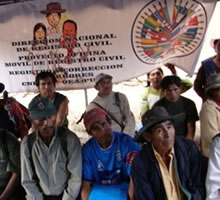 Through mobile registration and publicity campaigns in the Yungas, Manco Kapac,
Beni and Chuquisaca regions, and in collaboration with the National Civil
Registry Bureau of Bolivia, the right to identity is now a reality for more than
15,000 individuals, most of them indigenous.
Through mobile registration and publicity campaigns in the Yungas, Manco Kapac,
Beni and Chuquisaca regions, and in collaboration with the National Civil
Registry Bureau of Bolivia, the right to identity is now a reality for more than
15,000 individuals, most of them indigenous.
It is expected that by 2011 about 6,000 people in the rural areas of Potosi will have benefited from this mobile registration system.
Both operations have been funded through the Spanish International Development Cooperation Agency (AECID).
The Eastern Caribbean States: Antigua y Barbuda, Dominica, Grenada, St. Kitts y Nevis, Saint Lucia y St. Vincent.
Civil registry modernization. Computerization of records
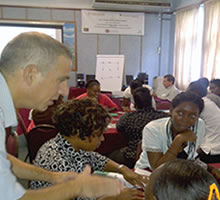 The
objective in this region is to digitize the information contained in record
books at the civil registries for vital records; primarily for births, deaths
and marriages.
The
objective in this region is to digitize the information contained in record
books at the civil registries for vital records; primarily for births, deaths
and marriages.
Additionally, this data will be stored in a searchable database using a customized Caribbean Civil Registry and Identity System (CCRIS) application with the registries having the ability to edit these records and print certificates on a secure media for issuing to the citizens in the country. It is expected that after an initial six (6) month period where a significant majority of work to digitize these historical records, which date as far back as 1905 would have been captured, the member states will integrate the project into their daily operational procedures.
The Canadian cooperation agency is funding the execution of this project, along with funds from USA and Chile.El Salvador
Strengthening the Hospital Records System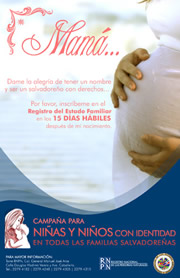
Since 2008, PUICA has supported the National Registry of
Natural Persons in the implementation of a hospital
registry of the National Hospitals of Sonsonate and
Ahuachapan. Between January and October 2011,
6.842 entries have taken place, 74% of births in the
offices of these two hospitals. Since opening in
December 2008 (Sonsonate) and August 2009 (Ahuachapan),
there have been 16.589 entries. The project contemplates
a continuous effort to raise awareness of the importance
of an identity at birth. Currently, an agreement is planned
to be signed with the Ministry of Health which will allow
the opening of offices in different hospitals of El Salvador
and shortly the opening of a third project office at the
Hospital San Miguel. The proposed hospital system in
El Salvador was funded by grants from the Spanish Agency for
International Development Cooperation (AECID).
Guatemala
Mobile registration and publicity campaigns. Institutional strengthening. Process audits
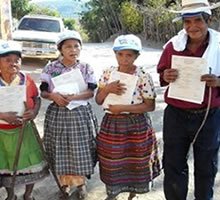 PUICA
has been working with the National Registry of Persons (RENAP) since 2008 with
funds from the Spanish cooperation. Several registration and awareness campaigns
were executed in different areas of the country including the municipalities of
Chichicastenango, San Pedro Sacatepequez, San Juan Sacatepequez, San Raimundo,
and Huehuetenango. Through training and cooperation of community leaders, more
than 3,000 people were registered for the first time. In addition, campaigns
managed to consolidate a network of local actors who continue to promote the
civil registry in the area. As a result of these campaigns, and by decision of
the RENAP, the Office for the reduction of under registration was created with
the purpose of achieving universal registration. PUICA will collaborate in the
strengthening of that office to expand thus gradually registration services to
all remote populations nationwide.
PUICA
has been working with the National Registry of Persons (RENAP) since 2008 with
funds from the Spanish cooperation. Several registration and awareness campaigns
were executed in different areas of the country including the municipalities of
Chichicastenango, San Pedro Sacatepequez, San Juan Sacatepequez, San Raimundo,
and Huehuetenango. Through training and cooperation of community leaders, more
than 3,000 people were registered for the first time. In addition, campaigns
managed to consolidate a network of local actors who continue to promote the
civil registry in the area. As a result of these campaigns, and by decision of
the RENAP, the Office for the reduction of under registration was created with
the purpose of achieving universal registration. PUICA will collaborate in the
strengthening of that office to expand thus gradually registration services to
all remote populations nationwide.
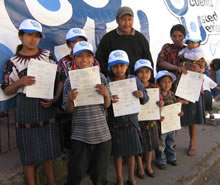 In
2010, and at the request of the Government of
In
2010, and at the request of the Government of
Guatemala, PUICA conducted an audit of the
RENAP processes. A plan of action was formulated
at the legal level, processes, and information
technology, where the tasks necessary to provide
a solution to the problems presented by the RENAP
were defined. Debugging the data of the DPI was
established within these actions. A team of OAS advisors
together with the RENAP ran the project verification and
cleansing of data of the IPR, which took place between
December 2010 and August 2011.
More than 5.3 million records of DPI were verified.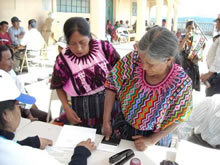 Since
September 2011, PUICA jointly with the Ministry of public health and the RENAP,
has developed a pilot installation of auxiliary RENAP headquarters in 5
hospitals to facilitate timely registration before leaving the hospital of all
babies that are born. Offices have been set up in Roosevelt Hospital,
Quetzaltenango, Escuintla and Chimaltenango.
Since
September 2011, PUICA jointly with the Ministry of public health and the RENAP,
has developed a pilot installation of auxiliary RENAP headquarters in 5
hospitals to facilitate timely registration before leaving the hospital of all
babies that are born. Offices have been set up in Roosevelt Hospital,
Quetzaltenango, Escuintla and Chimaltenango.The project was funded by grants from the Spanish Agency for International Development Cooperation (AECID).
Haiti
Modernization and integration of the Haitian civil registry system
The Haiti project is made up of three components:
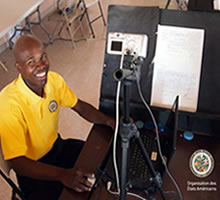 1.
Support to the National Identification Office (ONI): To this date more than 4.8
million Haitians (85% of the adult population) now have been registered as a
result of mobile registration campaign. In turn, the staff of the ONI has been
trained, equipping the facility with the necessary technology and infrastructure
to allow the opening of 141 offices across the country.
1.
Support to the National Identification Office (ONI): To this date more than 4.8
million Haitians (85% of the adult population) now have been registered as a
result of mobile registration campaign. In turn, the staff of the ONI has been
trained, equipping the facility with the necessary technology and infrastructure
to allow the opening of 141 offices across the country.
It is also important to note that PUICA accompanied the National Identification Office in the process of preparation for the 2011 presidential elections, supporting the reissuing of lost ID cards, issuance of new documents and distributing them.
2. Support to the National Archives of Haiti (ANH): More than 16 millones historical records have been digitalized in an electronic database, and 80 operators have been trained who are responsible for entering the information into the system.
3. Support to the registration of minors in the Civil Registry: The support in this area consists in the implementation of census campaigns, pilot registration projects in hospitals, and an effort to revise and modernize the law governing the national registration system.
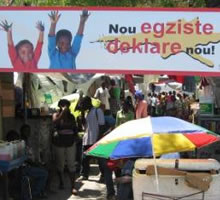 This project is being implemented with financial support
This project is being implemented with financial support
of the Canadian International Development
Agency (CIDA/ACDI).
PUICA also works with the National School of
Public Administration, Quebec, and with other
national and international actors.
Honduras
Reducing the Sub-Rgesitry Rate in the area of the Chamelecon River in the region of San Pedro Sula and the preparation of a diagnosis of technological infrastructure for the municipal offices
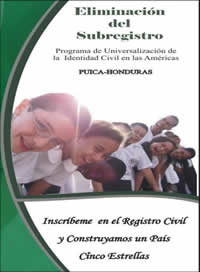 The
current PUICA project, which is being executed in a joined effort with the
National Registry of People (NRP) aims to contribute to the improvement of the
situation of registration in the area of the Chamelecon River in the region of
San Pedro Sula while elaborating a diagnosis of technological infrastructure for
the municipal offices. This initiative will be financed with funds from the
United States.
The
current PUICA project, which is being executed in a joined effort with the
National Registry of People (NRP) aims to contribute to the improvement of the
situation of registration in the area of the Chamelecon River in the region of
San Pedro Sula while elaborating a diagnosis of technological infrastructure for
the municipal offices. This initiative will be financed with funds from the
United States.
Mexico
Promotion of Civil Identity. Sharing Best Practices. Awareness
In Mexico, the strategy is based on cooperation with the National Registry of Population and Personal Identification to promote civil identity nationwide. To that end, an international symposium on measuring under-registration of births was held, and a workshop on best practices in civil registration technologies was conducted, along with a number of publicity campaigns to promote the importance of civil identity.
Canadian cooperation funds have helped these projects to be financially viable.
Paraguay
Modernization of the Civil Registry. Digitizing Historical Records. Binational Civil Registry mobile campaign, in border with indigenous communities.
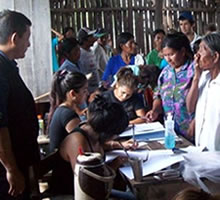 With PUICA’s contribution of computer equipment and technical support, the staff
of civil registry has digitized 2.943.000 of a total of 9.127.000 of birth,
marriage and death records, already entered in the database. Interoperability is
contemplated between the registry and other public entities in order to provide
greater transparency in the management, minimize bureaucracy, generate reliable
statistics and preserve original documents. The creation of the database of the
Civil Identity Registry has been possible through non-reimbursable financial
cooperation from the Canadian International Development Agency and a loan from
the Inter-American Development Bank.
With PUICA’s contribution of computer equipment and technical support, the staff
of civil registry has digitized 2.943.000 of a total of 9.127.000 of birth,
marriage and death records, already entered in the database. Interoperability is
contemplated between the registry and other public entities in order to provide
greater transparency in the management, minimize bureaucracy, generate reliable
statistics and preserve original documents. The creation of the database of the
Civil Identity Registry has been possible through non-reimbursable financial
cooperation from the Canadian International Development Agency and a loan from
the Inter-American Development Bank.
At the beginning of 2012, PUICA will support the Civil Registry by carrying out mobile registration campaigns in indigenous communities in the border with Bolivia, where a significant number of people do not have a birth certificate or identity card and therefore, have no access to state social programs. This project is funded by the German Agency for International Cooperation.
Peru
Mobile registration and publicity campaigns. Rebuilding destroyed records
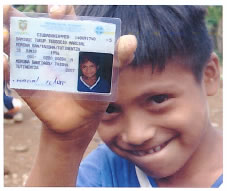 Through the system of mobile registration and publicity campaigns, more than
15,000 people have been registered in Peru. The campaigns were done in Huayc´┐Żn,
San Juan de Lurigancho, and Huancavelica. The records destroyed by the armed
conflict with the Shining Path in this latter town were also reconstructed.
Through the system of mobile registration and publicity campaigns, more than
15,000 people have been registered in Peru. The campaigns were done in Huayc´┐Żn,
San Juan de Lurigancho, and Huancavelica. The records destroyed by the armed
conflict with the Shining Path in this latter town were also reconstructed.
These projects were funded with help from Spain, USA, and Italy.
Bolivia, Ecuador, Paraguay and Peru
Promotion of Right to Identity
The Project for the promotion of the right to an identity in Bolivia, Ecuador, Paraguay and Peru contemplates several components. Four of them correspond to the execution of campaigns of registration and civil identification in the borders of Peru - Ecuador and Bolivia-Paraguay where sub-registration is severe. During the implementation of the project, civil registry institutions will receive technical assistance from PUICA in developing and implementing national methodologies to be exchanged between the countries contemplated in the project. As a result, civil registries will apply lessons learned and will be able to replicate these new methodologies in similar areas.
This Project is being executed with funds from the German Agency for International Cooperation (GTZ).
Regional activities
In addition to technical assistance projects, PUICA organizes regional activities such as meetings, workshops and activities of horizontal cooperation with other institutions of civil registry in the region.
CONTACT US
LAUNCH
MEDIA

1889 F St., N.W.
Washington, D.C., 20006
E-mail:[email protected]
Tel: (202) 370-5435
Fax: (202) 458-6250









 Photos
Photos